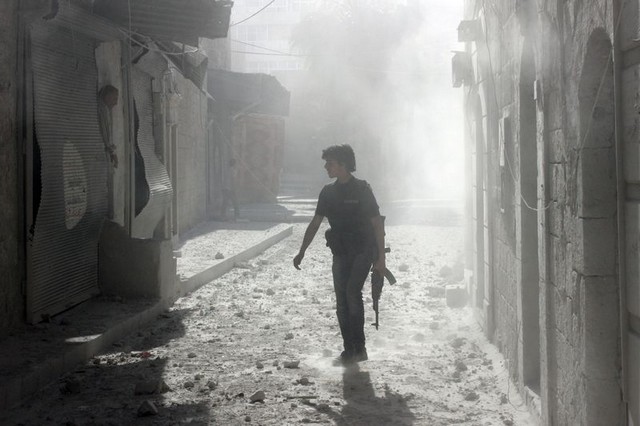By Thomas Gaist
A United Nations arbitrator suspended international negotiations over the war in Syria on Wednesday. New talks have been scheduled to begin in three weeks.
According to UN Syria envoy Staffan de Mistura, the cancellation of the talks was immediately prompted by the advance of Russian-backed Syrian government forces into key areas surrounding the city of Aleppo, breaking a three-year-old “rebel” siege of two Shia villages and cutting a supply line for the US-backed Islamist militias from Turkey.
Mistura said that the continuing fighting on the ground and the lack of progress after two days of talks had convinced him of the need for “preparatory work” by the “stakeholders.”
“I’m not prepared to have talks for the sake of talks,” de Mistura said.
The official purpose of the now-suspended talks was to reach terms for an end to the war and for a political transition process that would install a new and US-approved leadership in power.
The prospect of any settlement appears increasingly distant as fighting continues to escalate on the ground. Russia’s deployment of advanced fighter planes has, in fact, enabled the government to win a series of successes against the US-backed “rebel” militias, including the seizure of strategic areas in central and northern provinces.
The anti-Assad forces have been rolled back along several fronts through joint military actions involving Russian air forces and military advisors, in support of government ground forces and pro-Assad militias as well as Hezbollah fighters from neighboring Lebanon. The Obama administration strategy of relying on proxy militias, composed of fighters who are essentially mercenaries, has left the “Syrian revolution” vulnerable to the government offensive waged with close air support from Russian planes over the past four months.
The cancellation of the talks has produced a redoubled chorus of demands for Assad’s removal and bitter denunciations against Russian involvement.
“How can you … enter negotiations when you have unprecedented military pressure?” an unnamed “senior Western diplomat” told Reuters. “The Russians and regime want to push the opposition out of Geneva,” he said.
According to the narrative advanced by the corporate media, Russia’s military campaign is the main obstacle to a political deal that could end the war. In reality, it is the unswerving determination of the US and European ruling elites to remove Assad, a close ally of Russia, that is fueling a dynamic that leads squarely toward further escalation in Syria and direct confrontation between the major powers.
Throughout the “peace process,” the US and NATO have continued to escalate their military and covert operations in Syria, deploying Special Operations troops, building up conventional forces and war planes in neighboring Turkey and Jordan, and increasing their support for an array of Al Qaeda-linked and mercenary militias, including the same forces that are directly targeted by Russia’s air war.
Russia’s moves in Syria, essentially defensive in nature, are calculated to improve the bargaining position of Russia’s ruling oligarchy and its state apparatus in relation to imperialism. Moscow cannot accept the removal of such a critical ally, and has already signaled its own commitment to greater military support for Damascus.
A postwar Syria that is completely dominated by the US and NATO would deny Russia access to its strategic naval base on the Mediterranean, a strategic objective of Washington as it seeks the military encirclement and ultimate dismemberment of the Russian Federation.
Nonetheless, Moscow has already signaled its readiness to press forward with its operations, responding to the false start in Geneva by insisting that it will continue its offensive.
Russia’s top diplomat said Wednesday that the campaign will proceed until it has defeated the al Nusra Front, Al Qaeda’s Syrian affiliate, which is one of the largest armed groups challenging the Syrian government and one of the main beneficiaries of the arms and funding funneled in by the US and its regional allies, Turkey, Saudi Arabia and Qatar.
“Russian strikes will not cease until we really defeat terrorist organizations like Jabhat al-Nusra,” Russian Foreign Minister Sergei Lavrov said. “I don’t see why these air strikes should be stopped.”
US Army General Sean MacFarland told the media on Monday that ISIS is “beginning to demonstrate conventional warfare capabilities in places like Syria, Iraq and Yemen,” and has become “really more of a conventional force.”
In response, the US military is preparing to assist the Iraqi state to conduct larger and more sophisticated war operations, involving the full complement of modern heavy weaponry.
“We have shifted from a pure counterinsurgency focus and are now preparing the [Iraqi government forces] to conduct combined arms operations,” MacFarland said, speaking from Iraq.
“The ability to integrate infantry, armor, artillery, air power, engineers and other assets on the battlefield, provides the Iraqis with a decisive advantage over a static enemy dug in behind complex obstacle belts,” he said.
04 February, 2016
WSWS.org

